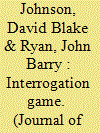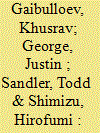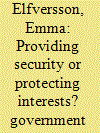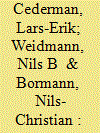|
|
|
Sort Order |
|
|
|
Items / Page
|
|
|
|
|
|
|
| Srl | Item |
| 1 |
ID:
142044


|
|
|
|
|
| Summary/Abstract |
Critiques of China’s ‘oil diplomacy’ center on its alleged disregard for transparency and human rights, yet such claims ignore that the problematic relationship between resource extraction and human rights precedes Chinese market entry. This article explores whether human rights implications are more serious for states exporting oil to China compared to another major oil importer, the United States. Contrary to the conventional wisdom, we argue that oil export dependence on the USA affects human rights more negatively than dependence on China because of differences related to the timing of market entry. The United States established stable relationships with oil supplier states decades ago, creating dependencies that are sufficiently long-term for the implications of the resource curse to take hold, and taking place before human rights became part of the US foreign policy agenda. In comparison, China’s late entry into global oil markets in the early 1990s meant that market access often required the provision of generous loan packages, which may help counteract the detrimental effects of oil dependence. Our empirical analysis examines the impact of oil export dependence on China versus the USA on human rights in supplier states for the 1992–2010 period. Results show that oil producing states dependent on exports to the USA exhibit lower human rights performance than those exporting to China. We also demonstrate that lower human rights performance for US exporters stems from long-term trends rather than short-term fluctuations in oil export dependence.
|
|
|
|
|
|
|
|
|
|
|
|
|
|
|
|
| 2 |
ID:
142038


|
|
|
|
|
| Summary/Abstract |
Violent domestic conflicts spread between countries via spillover effects and the desire to emulate events abroad. Herein, we extend this emulation logic to the potential for the contagion of nonviolent conflicts. The spread of predominantly nonviolent pro-democracy mobilizations across the globe in the mid-to-late 1980s, the wave of protests in former Soviet states during the Color revolutions in the 2000s, and the eruption of nonviolent movements across the Middle East and North Africa during the Arab Spring in the early 2010s each suggest that the observation of collective action abroad encourages a desire to emulate among potential challengers to domestic autocrats. However, the need to emulate varies. Potential challengers with a recent history of protest at home are less dependent (than are those without similar experience) upon foreign exemplars to mobilize the participants and generate the resources required to make emulation practicable. By contrast, where the domestic experience of protest is absent, opposition movements are more reliant upon emulation of foreign exemplars. We test the implications of this logic using a series of multivariate logistic regression analyses. Our tests employ data on nonviolent civil resistance mobilizations that occurred across the global population of autocratic states between 1946 and 2006. These tests, along with post-estimation analysis, provide evidence consistent with our conditional logic of emulation.
|
|
|
|
|
|
|
|
|
|
|
|
|
|
|
|
| 3 |
ID:
142047


|
|
|
|
|
| Summary/Abstract |
While there is widespread debate about techniques for obtaining information from non-cooperative sources, there is little research concerning the efficacy of different methods. We introduce the ‘Interrogation Game’ as a simple model of the information a source will provide when faced with either (1) an interrogator using coercive techniques or (2) an interrogator offering rewards. The model demonstrates that coercive interrogation results in a very slight increase in accurate information from knowledgeable sources, but much more inaccurate information from ignorant sources. In short, when ignorant group members refuse to provide information, this increases the inequality of payoffs among group members under coercion while the same behavior – truthfully revealing ignorance – decreases the inequality of payoffs under reward. If ignorant detainees have concern for the payoffs of their other group members, they will admit their ignorance in reward, but not coercion. We test the model with a group-based experiment. As the model predicts, coercion leads subjects to provide more inaccurate information. Contrary to the model’s expectations, however, accurate information is almost equally likely in the coercion and reward treatments.
|
|
|
|
|
|
|
|
|
|
|
|
|
|
|
|
| 4 |
ID:
142039


|
|
|
|
|
| Summary/Abstract |
Over the past two decades, the United Nations Security Council has responded more strongly to some humanitarian crises than to others. This variation in Security Council action raises the important question of what factors motivate United Nations intervention. This article offers a configurational explanation of selective Security Council intervention that integrates explanatory variables from different theories of third-party intervention. These variables are tested through a comparison of 31 humanitarian crises (1991–2004) using fuzzy-set qualitative comparative analysis. The analysis shows that a large extent of human suffering and substantial previous involvement in a crisis by international institutions are the key explanatory conditions for coercive Security Council action, but only when combined with negative spillover effects to neighboring countries (path 1) or with low capabilities of the target state (path 2). These results are highly consistent and explain 85% of Security Council interventions after the end of the Cold War. The findings suggest that the Council’s response to humanitarian crises is not random, but follows specific patterns that are indicated by a limited number of causal paths.
|
|
|
|
|
|
|
|
|
|
|
|
|
|
|
|
| 5 |
ID:
142040


|
|
|
|
|
| Summary/Abstract |
Based on spatial panel regressions for 1990–2012, this article draws publicness differences between peacekeeping personnel contributions to UN and non-UN peacekeeping operations. The analysis shows that UN missions are much less responsive to personnel spillovers, derived from other contributors’ peacekeepers, than is the case of non-UN missions. UN peacekeeping missions display either no response or free riding to these personnel spillovers, while non-UN missions indicate spillover complementarity. Moreover, a number of controls distinguish the two kinds of peacekeeping, where non-UN missions display income normality and UN missions’ deployments increase with the number of concurrent peacekeeping missions. The latter suggests that some countries specialize in supplying UN peacekeepers as a money-making venture. The positive response to the population variable supports this conjecture for UN missions, because a greater population base provides the recruits for peacekeeping operations. Our spatial empirical analysis accounts for the endogeneity of peacekeeper spillovers. The article concludes with a host of robustness tests that account for the alternative classes of peacekeepers, African Union and ECOWAS missions, and other empirical variants.
|
|
|
|
|
|
|
|
|
|
|
|
|
|
|
|
| 6 |
ID:
142045


|
|
|
|
|
| Summary/Abstract |
What factors drive governments’ decisions to intervene in local conflicts within their borders? Communal conflict – that is, organized violence between non-state groups that are mobilized along a shared communal identity – kills thousands each year and severely impacts local livelihoods, at times threatening to spread and affect entire regions. Given the state’s assumed monopoly over the legitimate use of force, we should expect the concerned governments to be critical actors of the overall effort to restore peace in cases of local communal conflict, but empirical evidence indicates that central states tend to only intervene in some cases but not in others. This phenomenon has so far been understudied and the variations in states’ efforts to manage these conflicts remain unexplained. This article presents the first quantitative study of state intervention in communal conflicts. Building on existing scholarly work, I argue that state intervention is explained by a combination of strategic interests and state capacity, and that interests related to ethnic constituencies and land control play an important part in explaining governments’ strategies. These propositions find support in a statistical analysis covering sub-Saharan Africa from 1989 to 2010.
|
|
|
|
|
|
|
|
|
|
|
|
|
|
|
|
| 7 |
ID:
142041


|
|
|
|
|
| Summary/Abstract |
Why do states participate in United Nations peacekeeping missions? Extant theory revolves around two benefits states derive from participation: the financial benefits participants receive for their contributions and the ability to further liberal norms abroad. Yet, these theories have received limited empirical support. In addition, they cannot explain where and when leaders send troops. To rectify these limitations, I focus on a more straightforward benefit states receive from limiting conflict and providing stability to war-torn regions. Namely, stabilizing conflict areas helps stem the externalities caused from ongoing conflicts, such as refugees. This explanation of participation in peacekeeping predicts who is most likely to send support (those fearing refugee inflows), the size of contribution (increasing relative to the inflows), and where they send assistance (to the specific conflict area producing the externalities). Statistical analysis of all UN peacekeeping missions since 1990 provides support for this argument and reveals that refugee flows better predict who is likely to contribute troops, and to what conflict, than the size of those contributions. While other realpolitik considerations strongly influence which states participate in UN peacekeeping, neither democracy nor state need is a statistically significant explanator of who contributes. However, state need does predict the size of contribution.
|
|
|
|
|
|
|
|
|
|
|
|
|
|
|
|
| 8 |
ID:
142042


|
|
|
|
|
| Summary/Abstract |
We study the association between natural resource rents and internal political stability, highlighting the importance of the distribution of political power as a mediating factor. We present a simple theoretical model demonstrating that increased rents are likely to be positively associated with the internal stability of a powerful incumbent while destabilizing a less powerful incumbent. Our empirical analysis confirms this prediction. Employing panel data for more than 120 countries from the period 1984–2009, our estimation results demonstrate that resource rents can promote political stability but only when political power is sufficiently concentrated. Indeed, if the incumbent is sufficiently weak, rents fuel instability. Our main results hold when we control for the effects of income, quality of institutions (rule of law, democratic accountability and corruption), persistence of political stability, time-varying common shocks, country fixed effects, possible endogeneity of rents and power balance to political stability, and various additional covariates. Our analysis departs from the existing literature by emphasizing not (only) the type of government, but rather the strength of government, as a key determinant of the impact of resource rents on political stability. This analysis sheds light on current political transformations and reconfigurations in the resource rich Middle East and North Africa.
|
|
|
|
|
|
|
|
|
|
|
|
|
|
|
|
| 9 |
ID:
142043


|
|
|
|
|
| Summary/Abstract |
We study the association between natural resource rents and internal political stability, highlighting the importance of the distribution of political power as a mediating factor. We present a simple theoretical model demonstrating that increased rents are likely to be positively associated with the internal stability of a powerful incumbent while destabilizing a less powerful incumbent. Our empirical analysis confirms this prediction. Employing panel data for more than 120 countries from the period 1984–2009, our estimation results demonstrate that resource rents can promote political stability but only when political power is sufficiently concentrated. Indeed, if the incumbent is sufficiently weak, rents fuel instability. Our main results hold when we control for the effects of income, quality of institutions (rule of law, democratic accountability and corruption), persistence of political stability, time-varying common shocks, country fixed effects, possible endogeneity of rents and power balance to political stability, and various additional covariates. Our analysis departs from the existing literature by emphasizing not (only) the type of government, but rather the strength of government, as a key determinant of the impact of resource rents on political stability. This analysis sheds light on current political transformations and reconfigurations in the resource rich Middle East and North Africa.
|
|
|
|
|
|
|
|
|
|
|
|
|
|
|
|
| 10 |
ID:
142046


|
|
|
|
|
| Summary/Abstract |
Does economic inequality cause civil war? Deviating from individualist measures of inequality such as the Gini coefficient, recent studies have found a statistical link between group-level inequalities and conflict onset. Yet, this connection remains controversial, not least because of the difficulties associated with conceptualizing and measuring group-level differences in development. In an effort to overcome weaknesses afflicting specific methods of measurement, we introduce a new composite indicator that exploits the strengths of three sources of data. The first step of our method combines geocoded data from the G-Econ project with night lights emissions data from satellites. In a second step, we bring together the combined spatial values with survey estimates in order to arrive at an improved measure of group-level inequality that is both more accurate and more robust than any one of the component measures. We evaluate the effect of the combined indicator and its components on the onset of civil violence. As expected, the combined index yields stronger results as more information becomes available, thus confirming the initial hypothesis that horizontal economic inequality does drive conflict in the case of groups that are relatively poor compared to the country average. Furthermore, these findings appear to be considerably more robust than those relying on a single data source.
|
|
|
|
|
|
|
|
|
|
|
|
|
|
|
|
|
|
|
|
|